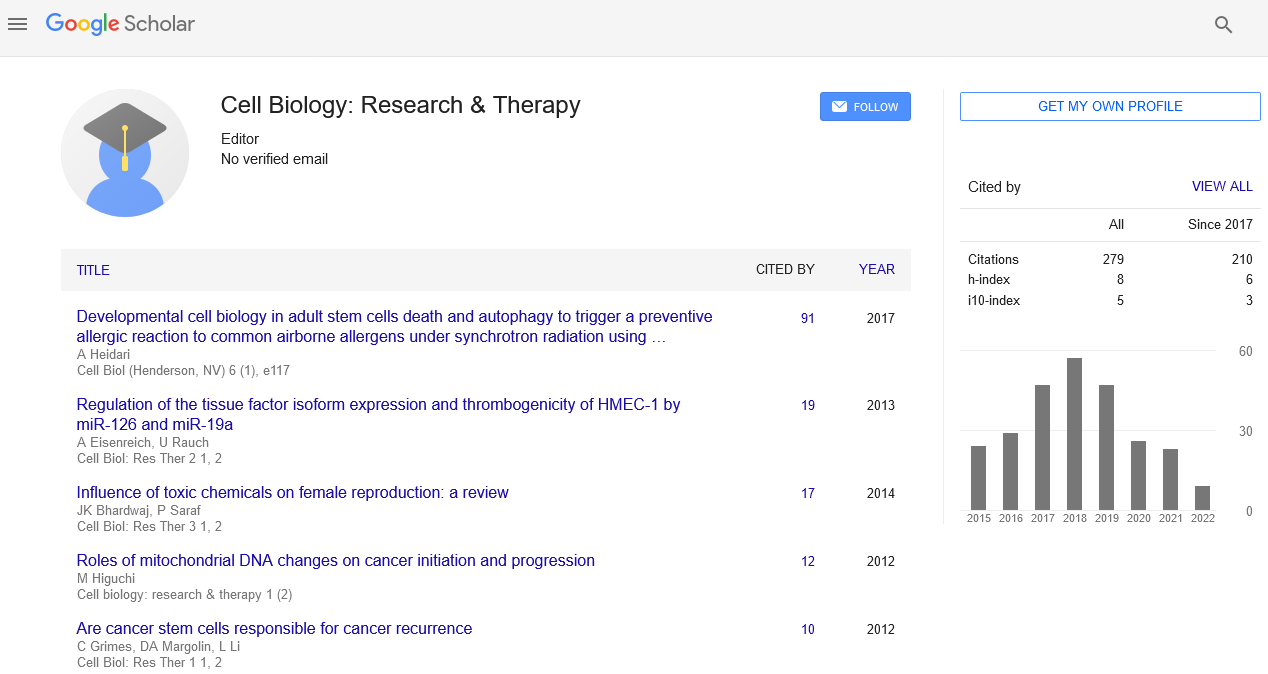Editorial, Cell Biol Henderson Nv Vol: 5 Issue: 1
Spontaneous Regression of Cancer, an Ever Actual Inspiration for the New Cancer Treatment
| Jozef Oleksyszyn* |
| Faculty of Chemistry, Division of Medicinal Chemistry and Microbiology, Wroclaw University of Sciences and Technology, 50-370 Wroclaw, Poland |
| Corresponding author : Jozef Oleksyszyn Faculty of Chemistry, Division of Medicinal Chemistry and Microbiology, Wroclaw University of Sciences and Technology, 50-370 Wroclaw, Poland Tel: +48713204027 E-mail: jozef. oleksyszyn@pwr.edu.pl |
| Received: April 18, 2016 Accepted: April 19, 2016 Published: April 21, 2016 |
| Citation: Oleksyszyn J (2016) Spontaneous Regression of Cancer, an Ever Actual Inspiration for the New Cancer Treatment. Cell Biol: Res Ther 5:1. doi:10.4172/2324-9293.1000e113 |
Abstract
Spontaneous regression (SR) of cancer (or remissions as in the case of the hematopoietic system cancer e.g. leukemia) is defined Everson and Coles book as the partial or complete disappearance of a malignant tumor in the absence of all treatment or in the presence of therapy which is considered inadequate to exert significant influence on neoplastic disease.
Keywords: Spontaneous regression; Chemotherapy; Bacterial vaccination
| Spontaneous regression (SR) of cancer (or remissions as in the case of the hematopoietic system cancer e.g. leukemia) is defined Everson and Cole’s book as “the partial or complete disappearance of a malignant tumor in the absence of all treatment or in the presence of therapy which is considered inadequate to exert significant influence on neoplastic disease” [1]. Dr. William Cole developed the procedure of vaccination of tumor patients with the bacteria Streptococcus pyogenes directly into the tumor which resulted in SR. Since it was too dangerous to use living bacteria, later on the heatkilled Serratia marrescens were used to induce the regression, and the 29% of terminally ill sarcoma patients had a relapse-free survival of more than 10 years, an efficacy comparable to that today’s modern chemotherapy. Interest in developing a more efficient vaccine with more defined ingredients produced under GMP conditions has not abated and, the promising phase I of clinical studies has recently been reported [2]. | |
| However, SR has also been proved to occur without bacterial vaccination [3,4]. Papac in the review papers [5] described the possible SR mechanisms and these include: immune mediation, tumor inhibition by growth factor and/or cytokines induction of differentiation, hormonal mediation, and elimination of a carcinogen, tumor necrosis and/or angiogenesis inhibition, psychologic factors, apoptosis and epigenetic mechanisms. The paper concludes that “elucidation of the process of SR offers the possibility of improved methods of treating and preventing cancer”, which is still valid and no one has been able to induce SR even in the animal model yet. Why is it so rare? The real mechanism seems to include the activation of the cells of the innate immune system and several reports concerning the cases of SR suggest such activation [6], including natural killer cells [7], T cells response (probably cytotoxic T cells) [8], cytotoxic T cells together with the dendritic cells [9], and natural killer cells together with neutrophils and macrophages [10]. Why the activation of these cells and SR is so rare? Fortunately, the accumulation of knowledge regarding the activity of natural killer cells, cytotoxic T cells, neutrophils, macrophages and dendritic cells, which all are parts of the innate immune system, has accumulated, and now we are able to provide a possible explanation. The cells of the innate immune system use glycolysis after activation, so after stimulation, they need a sufficient glucose concentration to be able to produce the ATP through glycolysis [11,12]. The scenario also has another additional side, even more unpleasant. The final product of glycolysis - lactic acid- needs to be transported outside these cells to allow glycolysis to be running, which happens through the mono carboxylate transporter located in the membrane of these cells [13]. And such a transporter is inhibited competitively by the high concentration of lactic acid outside of the cells. Cancer cells also use glycolysis for ATP synthesis and produce a large amount of lactic acid, thus forming the environment highly unfavorable for stimulation of the cells of the innate immune system. Such conditions, the low glucose and high lactic acid levels, were proven to take place in the case of colon and stomach cancers as capillary electrophoresis time-of-flight mass spectrometry demonstrated [14], and very likely is common to all cancerous tissue. Recently we have proposed a theoretical possibility to induce the activation of innate immune response and SR in vivo [15]. The proposal includes the application of ketogenic diet or simple starvation to replenish the excess of lactic acid in tumor environment. At this point, the alkalization of the organism by sodium bicarbonate is likely to be required, because sodium lactate is not inhibitory to the mono carboxylate transporter [13]. Starvation and/or the use of ketogenic diet or bacterial infection should lower glucose level and, consequently also lactic acid concentration after a while, also. Bacterial infection is known to induce hypoglycemia [16]. Then, glucose levels should be increased rapidly (or they increase themselves due to gluconeogenesis) resulting in the activation of the innate immune system of the cells and SR. In the light of which it comes as no surprise that SR is so rare and the required condition is extremely difficult to happen accidentally. The proposals need to be verified experimentally. | |
References |
|
|
